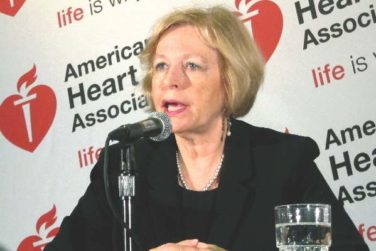AT THE AUA ANNUAL MEETING
NEW ORLEANS (FRONTLINE MEDICAL NEWS) – A constituent of the fertility drug clomiphene citrate restored normal testosterone levels in obese men, without suppressing spermatogenesis, the results of two trials showed.
Significantly more men achieved physiologic testosterone levels with enclomiphene than with a testosterone gel, Dr. Andrew R. McCullough said at the annual meeting of the American Urological Association. None of those who took the drug had any decrease in their baseline sperm count.
“Overall, these data show that testosterone restoration with [enclomiphene] could provide an advantageous clinical profile over gel-induced [testosterone] replacement,” said Dr. McCullough of Albany (N.Y.) Medical College.
The drug is an estrogen receptor antagonist. By blocking estrogen at the level of the hypopituitary axis, enclomiphene increases luteinizing hormone, which, in turn, increases endogenous production of testosterone.
He presented the results of two parallel, double-dummy trials, which randomized a total of 240 men to placebo, oral enclomiphene (Androxal), or a 1.62% transdermal testosterone gel.
Patients were all overweight or obese, and had related secondary hypogonadism, with a mean testosterone level of 200-230 ng/mL. They were a mean of 47 years old, with a mean body mass index of 33 kg/m2. Their baseline sperm counts were all normal, ranging from 75 million to 98 million/mL.
In both studies, enclomiphene increased testosterone levels significantly more than the gel. More men in both studies who took enclomiphene reached a normal testosterone level as well (60% vs. 15% and 65% vs. 35%). At the end of the studies, the combined mean testosterone level was 450 ng/mL in the enclomiphene group, compared with 350 ng/mL in the gel group.
“Unlike the exogenous testosterone, however, enclomiphene raised testosterone levels without having any impact on spermatogenesis,” Dr. McCullough noted. At 16 weeks, sperm count in those taking enclomiphene was unchanged from baseline, while it had decreased by 60% in those using the gel. More than half of those in the gel group also became oligospermic (with a sperm count of less than 15 million/mL) by16 weeks. Oligospermia occurred in less than 5% of men taking enclomiphene, similar to placebo. Neither treatment affected testicular volume.
Weight gain, arthralgia, headache, hypertension, and upper respiratory infection occurred in less than 5% of the investigational group – none of these was significantly different than occurred in the gel group.
Repro Therapeutics, which makes Androxal, submitted a new drug application to the Food and Drug Administration in February, seeking approval for treating low testosterone levels in men with secondary hypogonadism. It continues to pursue an adjunctive therapy for men with hypogonadism secondary to type 2 diabetes. “We believe there may be an association between the restoration of normal pituitary function and improvement of metabolic conditions such as type 2 diabetes,” the company said in a press release. “Research has been published” showing that increased insulin resistance, which is implicated in type 2 diabetes, “is associated with the onset of secondary hypogonadism,” the company said.
Dr. McCullough disclosed that he is a consultant for and holds stock in Repros Therapeutics. He also has received research funding from AbbVie, which makes AndroGel.
msullivan@frontlinemedcom.com On Twitter @alz_gal




